The noise in the ears causes many inconveniences in everyday life and prevents him from concentrating in the process of work. However, not many take this symptom, despite the fact that it can indicate many pathologies of the body.
Content
There are a large number of ways aimed at eliminating the noise in the ears. But in order to get rid of such unpleasant sensations, it is initially necessary to eliminate the cause of their appearance.
In order to figure out why noise appears and which doctor to contact for advice, we will consider the symptoms of the most common diseases and their treatment options.
Road in the ears: symptoms
Noise can occur in different parts of the ear. It is familiar with almost 10% of the adult population of the Earth. Its character can be different, and symptoms are accompanied by pulsation, pain in the head and in other parts of the body, a clouding of reason, cutting or dull pain. Constant noise in the ears can be a consequence:
- Hepatitis.
- Diabetes.
- Hypoglycemia.
- Diseases of the temporomandibular joint.
- Myoclonus of the muscles of the soft sky and middle ear.
Often this symptom is manifested in conjunction with others. However, not all of them are indicators in which it is urgent to make an appointment with the doctor.
If the noise in the ears and head lasts a long time, you should contact a specialist in case of the following symptoms:
- Dizziness.
- Nausea.
- Vomit.
- The swelling of the soft tissues in the area of \u200b\u200bthe ear shells.
- Pain.
- A breakdown.
- Improving body temperature.
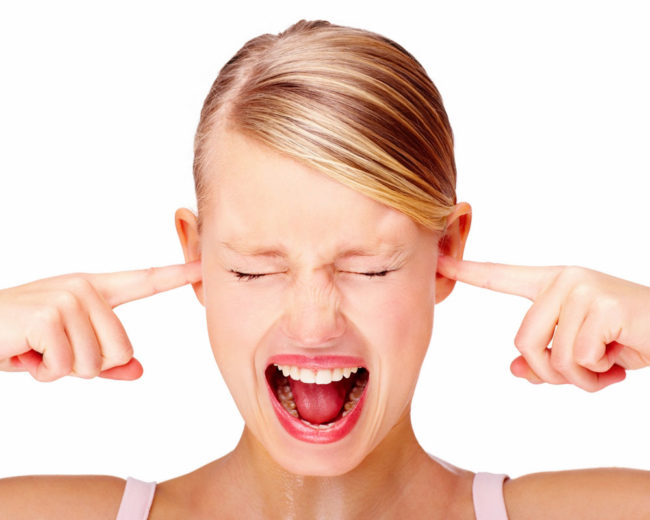
Pulsating noise in the ears can be a consequence:
- Atherosclerosis.
- Arterial hypertension.
- Arteriovenous malformation.
- Intoxication.
This is due to several factors:
- Deterioration of blood patency in the vessels.
- The presence of cholesterol plaques.
- The interweaving of veins.
- Oxygen starvation of cells.
- Poisoning of the body by harmful substances.
If the noise in the ears pulsates for a long time for a long time or after active physical exercises, then for treatment it is necessary to consult the next doctors:
- Neuropathologist.
- Cardiologist.
- Otolaryngologist.
- Therapist.
- Psychiatrist.
For complete diagnosis, the following methods are used:
- Audiometry.
- MRI.
- EEG of the brain.
- Pneumotoscopy.
- Tympanometry.
- ECG.
The noise of the right ear is not an independent disease, but it may indicate the presence:
- Vegeto-vascular dystonia.
- Right -handed otitis media ..
- Cloud-brain injury
- Malignant tumor formations in the brain.
- Hypotension or hypertension.
- Atherosclerosis.
In the event of right -sided otitis media, in addition to noise, patients note the feeling of congestion and pain. Also, these symptoms may be present due to taking antibacterial drugs or other medications that have an otoxic effect.
The noise in the left ear, as a rule, is accompanied by a number of other symptoms. The most common of them:
- The presence of purulent discharge.
- Irritation.
- Pain at the time of contact.
- Redness of the outer shells.
Noise can occur after air travel, diving, attending public events with loud music, using a headset for gadgets, sports. This symptom also indicates possible increased pressure.
In this case, the noise will pass independently within 2-3 hours. If the improvement process does not occur, then it is necessary to contact specialists for examination and treatment prescription.
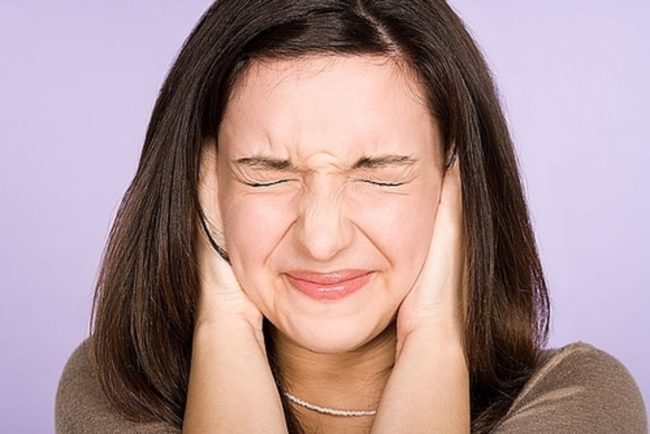
Often, the noise in the ears is also accompanied by dizziness. The main reasons for the manifestation of this symptom include such diseases:
- Pathology of the brain (concussion, bruises of tissues).
- Osteochondrosis of the cervical vertebrae (in their improper position, the process of blood circulation is disturbed).
- Hypertension (it is also characteristic of it: headache, weakness, vomiting, nausea).
- Neurology (neurosis, tumors, stress).
- A variety of disorders from the cardiovascular system.
- Meniere disease (accompanied by nausea, dizziness, unstable indicators of blood pressure, impaired coordination of movements).
The congestion and noise in the ears cause many troubles in everyday life. Indeed, with their manifestation, a person cannot holistically perceive the world, as well as distinguish sounds. This symptom, in addition to the main neurological pathologies and diseases of the hearing organs, can be caused by the following factors:
- Listening to loud music.
- Frequent use of a mobile phone and headset.
- Long stay on a trip or in places with a large number of transport.
- Pathologies of the adrenal glands and the development of certain hormones.
- Diabetes.
Most often, the congestion passes independently. However, if this symptom manifests itself for several days, then it is worth contacting a specialist in a narrow profile, since this indicates the progression of the initial cause - the underlying disease in the body.
Headache and ears in the ears are manifested in patients of almost all ages. In adolescents, most often this symptom occurs due to hormonal disorders. In older people, as a result of the progression of diseases of the cardiovascular system and hypertension.
Also, during menopause, many women experience noise in their ears, accompanied by a headache. To facilitate well -being, they independently take drugs with caffeine. But they should refrain from them with hypertension.

Such medicines include:
- Citramon.
- Askofen.
- Copacil.
- Pharmadol.
- Expedrin.
- Citropak.
- Tsucon N.
For patients who have increased blood pressure, it is recommended to take drugs aimed at reducing it. As soon as the indicators return to normal, noise and headache will retreat.
Noise in the ears: reasons
With a deterioration in well -being, many of us are wondering: “Why does a noise in your ears?” The most common reasons include:
- The presence of a foreign body in the ear.
- Fabric inflammation.
- Sulfur plugs.
- Malignant tumors.
- Otosclerosis.
- Meniere disease.
- Sensnevoral hearing loss.
- Injuries of hearing and brain organs.
- Presbiacusis.
- Side effects of treatment with antibiotics and diuretics.
- Labyrinite.
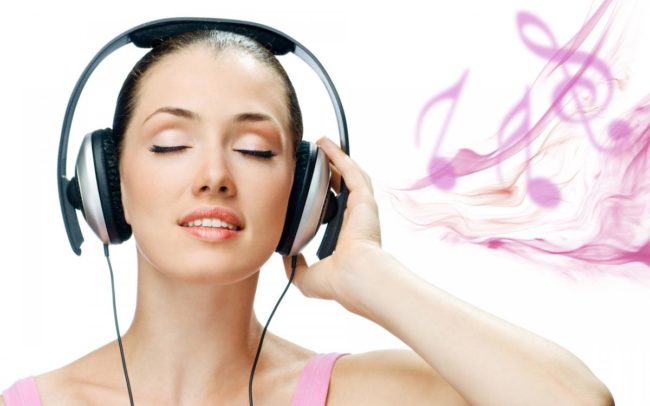
Noise and pain in the ear most often arise due to such factors:
- Inaccurate use of ear sticks.
- Inappropriate hygienic care.
- The presence of purulent inflammations or wounds.
- Injuries.
In order to independently disinfect the hearing organ, as well as soften a possible sulfur plug, it is enough to drip each of the ears with 3 drops of hydrogen peroxide. However, this method will bring only temporary relief.
In order to eliminate the sulfur plug finally, as well as check the ear for the presence of infections and inflammation of the tissue, it is necessary to examine the otolaryngologist.
Cervical osteochondrosis and noise in the ears are familiar to many of us. The development of pathologies of hearing organs arises for the following reasons:
- Squeezing vessels in the cervical region.
- Blood obstruction through the veins.
- Anatomically incorrect position of the vertebrae leading to deformations of tissues and organs.
- Oxygen starvation of the brain.
- Vascular interweaving.
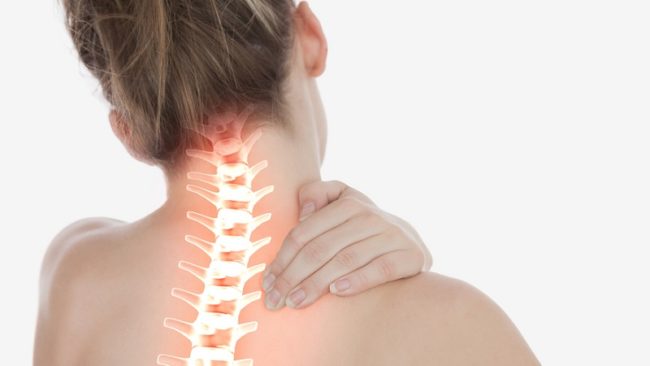
A number of methods aimed at improving the flexibility and mobility of the vertebrae are prescribed as a treatment. After all, the noise in the ears is a consequence, not the root cause. The most popular are the following recommendations:
- Daily walks.
- Regular sports.
- Massage.
- A complex of physiotherapeutic procedures.
- Drug treatment.
- Taking drugs aimed at improving the condition of the spine and joints, as well as to strengthen them.
The noise in the ears in older people can be associated with the presence of many diseases of different body systems. In order to eliminate them, first of all, it is necessary to find the reason.
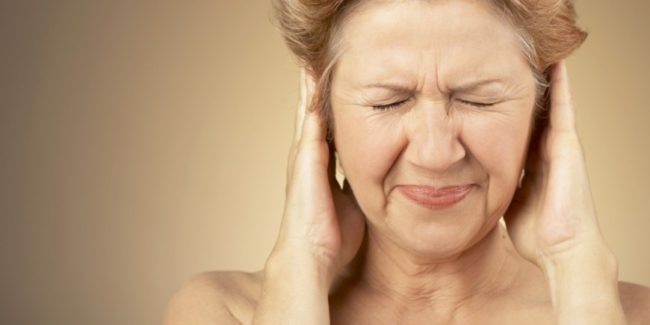
Noise in the ears often occurs due to pressure problems. Both hypotonic and hypertension often complain of such an unpleasant symptom. Among the elderly, there is a risk group of those who can also face this problem. Therefore, it is necessary to undertake complex treatment to eliminate them or to stabilize the condition as much as possible.
Factors that provoke the appearance of noise in the ears include:
- Hypertension.
- Hypotension.
- Diabetes.
- Osteochondrosis of the cervical vertebrae.
- Neurological diseases.
- Atherosclerosis.
- Hypoglycemia.
- Pathology from the central nervous system.
- Disorders of the thyroid gland and adrenal glands.
- Injuries or transactions on the brain.
- Klimax.
- Anemia.
- Hepatitis.
- Disorders of the cardiovascular system.
Noise in the ears: treatment
Many of us ask the question: “What to do if the noise in the ears has begun?” First of all, it is necessary to remain calm and not panic.
- If you did not have such a symptom earlier, most likely, these sensations will pass on your own within the next 2-3 hours.
- In the case when the improvement has not occurred after time, it is time to take measures.
To treat noise in the ears, several methods are used, depending on the cause of its occurrence, duration and location.
- The specialist, relying on his profile, as well as general symptoms, previously conducts an examination. After that, drugs are prescribed individually.
- If the cause of noise and pain was sulfur plug, a fistula or purulent inflammation, then the doctor makes a number of cleaning procedures, after which the patient independently rinses his ear, and also makes dressings at home.
To eliminate noise in the ears, the following drugs are used as treatment:
- Psychostimulating and nootropic direction (Fezam, biotropil, locams, piracetam, neurodar).
- Anticonvulsants (encrat, Finlepsin, Zeptol, Timonil).
- Improving blood vessels and blood circulation of the brain (memory, Cavinton).
- Antihyxation (Rimaur, angiosil).

In rare cases, psychotropic drugs are used as noise drugs in the ears. They are necessary in cases where a narrow specialist revealed violations by the psyche and central nervous system, while there are no concomitant diseases in which there is no manifestation of this symptom.
In such a situation, they use a medicine for noise in the ears:
- Lypralin.
- Peopleomil.
- Zoloft.
- Ajuvin.
- A-depressin.
- Remerone.
- Saroten.
Also indispensable for drug therapy are general strengthening agents. The following preparations are effective from the noise in the ears:
- Capillar.
- Neuromidine.
- Antist.
- Glycine.
- Mexicop.
- RILUTET.
- Glycycked.
Noise in the ears: folk treatment
As an addition to the main drug therapy, it is effective to use traditional medicine recipes. Of course, they cannot completely exclude pharmacological drugs, but will help to enhance their effect, which will significantly accelerate the process of recovery. If you are looking for an answer to the question: “How to treat noise in your ears?”, Then it is worth it to arm yourself with the following tips:
- For the preparation of mint tincture, you will need: half a glass of dried leaves and 1.5 cups of vodka. Having mixed all the ingredients, leave them for insisting in a dark place on an attraction for 7 days. Then strain and instill 4 drops in each ear, then install a cotton swab and cover your head with a warm scarf. After 2 weeks, you will notice the first result, but it is permissible to use the product within 21 days.
- Raw potatoes are eliminated from the peel, and then cut into small pieces. Honey is applied to one of them and put in the ear. Next, a hat is put on the head. This procedure is recommended to be used until the noise completely disappears.
How our ancestors knew how to get rid of the noise in the ears. They were engaged in harvesting herbs, so they knew that you could get rid of any ailment with the help of nature forces. The most effective recipe is the following. You will need:
- 3 tbsp. dry leaves of currants.
- 3 tbsp. Lilac flowers.
- 3 tbsp. dried elderberry.

Step -by -step cooking looks like this:
- Mix all the components and pour 700 ml of water.
- We boil for 20 minutes, without stopping stirring.
- Cool for 15 minutes. And we filter with gauze.
- Before eating, we drink 70 ml three times a day.
- The decoction must be used until complete recovery.
Whatever the product from the noise in your ears you choose, it must be remembered that the correctly diagnosed, as well as drug therapy, will significantly improve the effect of taking decoctions and hulls.
It is important to remember that you can not start taking any drugs yourself. And in order to get rid of the noise in the ears forever, it is necessary to lead an active lifestyle, abandon smoking and alcohol and, of course, adhere to proper nutrition.









Comments
a couple of years ago, there was no side of metrogils from the same problem, there were no side effects ...
I’m not a fan of peeling at all, it saves from acne of metrogil, it also smoothes it ...
Great article! ...
I take the second course of the Capsules Climafite 911. The tides went very quickly. It became calmer, irritability went away and I sleep well ...
i also noticed - it is worth nervous, everything immediately affects the face. Therefore, I try to avoid conflicts and unpleasant people. Of the creams, I like Miaflow from wrinkles - smoothes not only small wrinkles ...